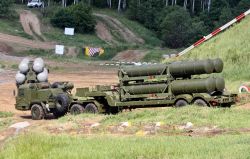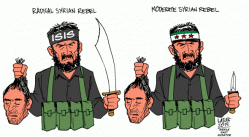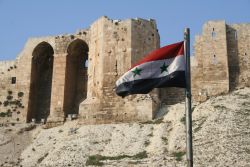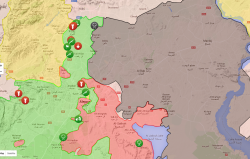As we have stated previously, the downing of a Russian jet in Syria by the Turkish military was clearly a provocation on the part of the Turkish president Recep Tayyip Erdogan. His aim was to stop an alliance being formed between Russia and the West in Syria. He has achieved the opposite with Turkey now more isolated and the major world powers coming closer to each other while Turkey and Saudi Arabia have been elbowed to one side.
While official NATO leaders were quick to state the right of Turkey to defend its sovereign space after downing the Russian jet, they were also quick to call for restraint on the part of Russia as well as Turkey. “De-escalation” was the buzzword all major world leaders were using.
Meanwhile a stream of leaks and unofficial comments have been aired on international media displaying the opposition of the West to the actions of Erdogan. Particularly interesting was the comments of former Vice Chief of Staff of the U.S. Air Force, Lt. Gen. Tom McInerney, who in an interview on Fox News’s “Real Story” said that the Turkish action was a “big mistake”. He made the point that the crossing through Turkish airspace would have lasted 20-40 seconds at most, and on a trajectory back toward Syria. Thus he deduced that the downing would have had to be a preplanned event.
McInerney went on to say said that while he was a NORAD commander in Alaska, they would never have done anything like this: “This airplane was not making any manoeuvers to attack the territory. It was probably pressing the limits, that’s fair. But you don’t shoot ’em down just because of that.”
Asked by the presenter about a possible NATO reaction to an intentional provocation by Russia, he said that he thought “the intentional provocation was by Erdogan” and noted that “Turkey used to be a very secular nation but he [Erdogan] has driven it away from secularism towards an Islamic society with Sharia law etc.” He also raised the idea that Erdogan may have a hidden agenda, i.e. to provoke Russia and NATO into getting into another conflict like in Ukraine, which the general believes the US can do without. He went on to say that most of Turkey’s attacks have been against the Kurds and that he does not trust Erdogan. (See the full interview here)
While this comes from a retired unofficial source, the fact that it was highlighted on Fox News is clearly a message to show the real thinking of the US ruling class. Unofficially the US has also told Reuters that it does not believe the Russian jet was in Turkish airspace when it was shot down, meaning that they disagree with Erdogan’s official explanation.
Russia and the Syrian battlefield
It is clear that the intervention of Russia in Syria has seen an increased pressure on Turkey and Saudi Arabia and their proxy militias, in particular the Al Qaeda groups and their auxiliary groups who operate in northern Latakia, Idlib and Aleppo provinces. In the past few weeks, these groups received their first significant setbacks in a year in the face of advancing Syrian, Iranian and Hezbollah forces supported by Russian airstrikes. In fact the Russian jet which was shot down was a part of a campaign against a Turkmen militia, Alwiya al-Ashar, which has been a conduit of arms, cash and ammunition from CIA and Turkish-Saudi sources to Al Qaeda aligned forces fighting in northwestern Syria and their auxiliaries.
Meanwhile, from the point of view of the US and its western allies, Russian intervention has been seen as an opportunity to end the unsustainable war which is destabilising the whole region. This came to the fore after the Paris attacks which lead to a unanimously passed UN resolution calling for an international effort to defeat all Islamist groups in Syria – including the above mentioned ones.
This was clearly seen as a threat by Turkey and Saudi Arabia, two regimes which have invested a great deal of resources, as well as prestige and “political capital”, in these imperialist interventions. Especially the plan proposed by France to set up an international coalition of forces together with Russia and Iran was seen as a threat by them as it could mean the decimation of their influence in Syria and throughout the whole region.
That is the reason why they have been lashing out. But they have not only been lashing out against Russia, but also against western supported groups as well. Over the past few weeks, clashes between Al Qaeda groups and groups belonging to the newly formed Syrian Democratic Forces (a US backed group consisting of the Kurdish YPG and dubious, yet non-jihadist remnants of the FSA) have increased.
Map of Northern Aleppo Countryside.
Black areas are controlled by ISIS, yellow by Kurdish forces, green by Turkish and Saudi supported forces and red by Syrian regime forces along with their allies.While Jabhat alNusra threatens to attack the Kurdish canton of Afrin, other groups close to the group attacked positions held by Jaish al-Thuwur which is a part of the SDF in the Northern Aleppo countryside. Russia in return embarked on a series of air raids in northern Aleppo, designed at disrupting trade through Turkey, some of which were in defence of Jaish al-Thuwur. Thus for the first time, Russian jets have been giving air support to US-backed troops fighting against Turkish-backed Al Qaeda groups. The result, apart from causing great damage in the important border towns of Azaz and Manbij, was for the SDF to take the village of al Malikiye from Ahrar alSham and Jabhat alNusra. Similarly a campaign has been started by the small Kurdish enclave of Sheikh Meqsud near central Aleppo, to cut of Jabhat al-Nusra supply lines into the city.
 At the same time, Putin used the the downing of the jet to move a Russian S-400 missile defence system to Syria. This is one of the most advanced – if not the most advanced – missile defence systems in the world, giving Putin full control over around half of Syrian airspace. In light of the provocation by Erdogan, the Americans could do nothing but accept this aggressive measure which means any plane flying over Syria could be hit by this system.
At the same time, Putin used the the downing of the jet to move a Russian S-400 missile defence system to Syria. This is one of the most advanced – if not the most advanced – missile defence systems in the world, giving Putin full control over around half of Syrian airspace. In light of the provocation by Erdogan, the Americans could do nothing but accept this aggressive measure which means any plane flying over Syria could be hit by this system.
As we have seen, the downing of the Russian jet was a desperate act on the part of Erdogan to stop the budding coalition. But instead Erdogan being strengthened, it seems that he has been weakened. Contrary to Erdogan’s wishes, France’s president Hollande has continued his call for a wider international coalition in particular after a visit to Moscow. Reiterating their common goals in Syria, Hollande said the following at a joint press conference with Russian president, Vladimir Putin:
“First, we will intensify the exchange of intelligence and any other information between our militaries.
“Second, the strikes on Isis will intensify and become part of a co-ordinated campaign in order to make them more efficient.
“Third, and Mr Putin also stressed this, we must focus our airstrikes on Isis and other terrorist groups.”
Furthermore, today France’s Foreign Minister, Laurent Fabius, speaking on solving the situation in Syria, said that “Two sorts of measures are required: the bombings, and troops on the ground, which could include Free Syrian army forces, Sunni Arab forces and — why not? — regime forces.”
It is clear that the world Imperialist powers have come to an agreement on how to proceed in Syria in the coming period. While Russia wants to defend its own position in Syria and use the civil war to retain its position as a major power, the western Imperialists realise that their tactic of relying on Islamist proxies to fight ISIS will not work. Unable, for political and economic reasons, to put troops on the ground, they are forced to rely on Russia, Iran and Hezbollah.
The events playing out in front of our eyes are a reflection of both the limits and weaknesses of US imperialism. The defeats in Iraq and Afghanistan have made it impossible for Obama to intervene directly in Syria and Iraq today, which means that he has been forced to rely on Iran and Russia, whereas the traditional allies of the US are becoming more like liabilities. Erdogan’s aggression against Russia merely helped bring reality in line with this underlying change in the balance of forces.
 The hypocritical support the West gave to the so-called “moderate” rebels of Syria has been exposed, as they are now turning their backs on those same “moderates”. Today, one of those groups, the Al Fateh Brigade, which took up arms in 2012, revealed its true colours by joining the Al Qaeda offshoot, Ahrar alSham. These groups, who used to be nothing but an official front through which the CIA could transfer resources to the Islamists, are losing their raison d’etre – i.e. a means of siphoning off to islamists US arms sent to the so-called “moderates” – meaning that there is no need for them to keep on pretending.
The hypocritical support the West gave to the so-called “moderate” rebels of Syria has been exposed, as they are now turning their backs on those same “moderates”. Today, one of those groups, the Al Fateh Brigade, which took up arms in 2012, revealed its true colours by joining the Al Qaeda offshoot, Ahrar alSham. These groups, who used to be nothing but an official front through which the CIA could transfer resources to the Islamists, are losing their raison d’etre – i.e. a means of siphoning off to islamists US arms sent to the so-called “moderates” – meaning that there is no need for them to keep on pretending.
Even on the question of the removal of Assad, many of the intelligent bourgeois are changing their stance. After four years of erosion of the state apparatus, which was already extremely centralised, the importance of the figure of Assad as the only force able to hold it together has increased. To remove Assad would now mean the collapse of the Syrian state and a replication of the chaos which turned Iraq into a “failed state” and a source of instability. Therefore, for the moment, the West is willing to leave the question of Assad to one side, although, of course, in the long run that might change. But for now the man the British, French and American governments wanted to bomb not so long ago, has now become a de facto ally!
All of this, if taken to the end, would mean a major defeat for Turkey and Saudi Arabia who have invested heavily in overthrowing Assad and dominating Syria through their Islamist proxies. For these regimes, which are in a deep crisis themselves, such a defeat could enhance their internal contradictions, paving the way for their downfall. This is why they are acting desperately and will probably continue to do so.
 The genuine movement of the youth against Assad, the beginnings of a Syrian revolution, was very quickly cut across by reactionary Islamist forces – supported by US imperialism. At the time the imperialists could not intervene directly against the Egyptian and Tunisian revolutions. But in Libya and Syria they saw the opportunity to intervene. They bombed Libya and in Syria they backed reactionary forces. In both countries, the imperialists have made a mess of the situation, inciting ethnic, tribal and religious conflicts.
The genuine movement of the youth against Assad, the beginnings of a Syrian revolution, was very quickly cut across by reactionary Islamist forces – supported by US imperialism. At the time the imperialists could not intervene directly against the Egyptian and Tunisian revolutions. But in Libya and Syria they saw the opportunity to intervene. They bombed Libya and in Syria they backed reactionary forces. In both countries, the imperialists have made a mess of the situation, inciting ethnic, tribal and religious conflicts.
The result of all this is the division of Libya, Syria and Iraq. In Iraq, the US occupation followed by a Shia government discriminating against Sunnis laid the basis for the rise of ISIS on the back of Sunni discontent towards the government in Baghdad. In Iraq the Kurds have carved out a de facto independent – “autonomous” – region. In Syria the Kurds have also taken control of their own region, under de facto autonomy from the Assad regime. This has now also spilled over into Turkey. In fact the very foundations of all the states in the Middle East have been undermined, with the old borders drawn up in colonial times becoming meaningless.
This is the result of imperialist meddling in the internal affairs of all these countries of the Middle East. Tony Blair has even admitted – in a rare moment of lucidity – that the war in Iraq may have had something to do with the rise of ISIS! Now the imperialists are rushing to come together with Putin – who not so long ago was persona non grata after the events in Ukraine – to try and clean up the mess they themselves created. But by intervening they will solve nothing.
As we have consistently explained, the task of overthrowing the despots who governed and still govern over the Middle East, belongs to the peoples of those countries. The only way of stopping the region descending further into barbarism is for the working people to rise up against their exploiters, both local and international.

